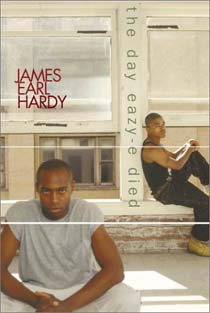 |
|
The Day Eazy-E Died by James Earl Hardy; Alyson Books; 178 pages; $21.95.  The Day Eazy-E Died is the fourth novel in James Earl Hardy's series
about young, men-loving, African-American men. His first three books, B-Boy
Blues, 2nd Time Around and If Only for One Nite, chronicled journalist
Mitchell Crawford's evolving relationship with "B-Boy" model Raheim Rivers.
The Day Eazy-E Died is the fourth novel in James Earl Hardy's series
about young, men-loving, African-American men. His first three books, B-Boy
Blues, 2nd Time Around and If Only for One Nite, chronicled journalist
Mitchell Crawford's evolving relationship with "B-Boy" model Raheim Rivers.
As the two young men explored their love for one another, they dealt with such issues as racism in the gay community, homophobia in the Black community, Raheim's relationship with his parents and his young son, "L'il Brotha Man". In 1995 the hip-hop community was shaken by the AIDS-related death of Eazy-E (Eric Wright), founder of the rap group NWA. Eazy's death was a reminder of AIDS's devastating impact on African-American men. Even today "AIDS is the leading cause of death among African-Americans between the ages of 25-44" and "African-Americans account for 56% of all reported cases." Unfortunately, racism and homophobia, drug use, poverty and a inadequate health care system combine to stifle AIDS prevention and guarantee that this epidemic will be with us for a long time. In The Day Eazy-E Died Hardy uses Raheim as a vehicle to explore some of the issues involving AIDS among African-Americans. Like many other "B-Boys", Raheim was reminded of the reality of AIDS by Eazy's death; and the fact that he is in a relationship with another man only served to bring the epidemic closer to home.
Hardy moves his story at a fast pace, and manages to include a lot in 178 pages; even so, the reader is left wanting more. There are a lot of issues in this book, from AIDS denial to the widespread belief that HIV is a white plot to destroy the Black community. Those in the know will enjoy trying to figure out who Hardy is writing about, in his depiction of closeted homosexuality in the world of hip-hop. Though Eazy-E - a former drug dealer - had a history of IV drug use, it is not impossible that he contracted HIV from sex with another man, nor was he be the only rapper to practice homosexuality in the "down low". It is to Alyson's credit that it is going out of its way to promote The Day Eazy-E Died. Hardy himself is doing his part, appearing on BET and otherwise promoting this important book within the African-American community. Six years after Eazy-E's death, when much of white America thinks that AIDS is over, this epidemic continues to kill Black men, women and children, not only in Africa but also in America. James Early Hardy has sounded the alarm. Will anyone listen? I doubt anyone will find sociological value out of The Song of Sir Rod the Long: A Gay Romance of the Round Table by Larry Howard (Writers Club Press; 212 pages; $12.95). Old timers will remember Howard as the author of two 1980's gay romps, The Lion's Den and Joe and the Show Queen. In his first book in almost two decades, Howard skewers the Arthurian legends and gives them a decidedly gay twist. Though historians may frown at the anachronisms that abound this loose narrative, the rest of us will forgive Howard for taking wide liberties on the trail of Sir Rod the Long. After all, Thomas Malory, Arthur Tennyson, T. H. White and Marion Zimmer Bradley were not historically correct in their renditions so why should Larry Howard? Though Howard's version is nowhere as good as his predecessors', his book is sure to entertain the gay reader who, like me, grew up on Camelot and The Sword in the Stone. Taken with a rock of salt, The Song of Sir Rod the Long is quite enjoyable.
|


 Jesse Monteagudo is a freelance writer who lives in South Florida with
his domestic partner. He can be reached at
Jesse Monteagudo is a freelance writer who lives in South Florida with
his domestic partner. He can be reached at